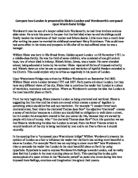Both poets use different symbolism to convey their ideas to the reader. Wordsworth shows his feelings for London in a figurative way. He personifies the sun, river and the city. He allows them to perform human functions such as wearing clothes. He continues this simile giving the river 'a will', something which is unique to people. He says 'The City now doth like a garment wear the beauty of the morning'. This gives the impression that the city is alive, not just an inanimate collection of buildings. I interpret this personification to mean that the city takes the beauty of the morning to disguise it dirtiness and ugliness.
William Blake's poem conveys his feelings in a more abstract style, when he uses the people and buildings of London to represent the institutions, which they are associated with. He uses the image of a church to criticise religious establishments and a palace to signify the state, and authorities that control it. He gives the image of the soldier's sigh running in blood down palace walls. Here he is attacking the monarchy and government for condemning young men to death by sending them off to fight in foreign wars.
Many of the words in Blake's poem have more than one meaning. In the first line he talks of London's 'charter'd' streets. Chartered can be interpreted to mean responsibility of the church or state or licensed; on the other side of the coin it can be use to mean licentious and freely immoral. Taken in context with the rest of the poem I consider it to mean freely immoral as further on in the poem he alludes to prostitution, and other such corrupt activities.
According to traditional reading the picture of London we see in Wordsworth's poem is an exaggerated tribute to the beauty of London. It uses imagery and praises both nature and mans achievements. It immediately sets out how the author feels in the first line saying 'Dull would he be of soul who could pass by, a sight so touching in its majesty.' Inferring that the sight of London would evoke strong views in everyone who sees it. It is left up to the reader to decide whether this is a compliment or a criticism. Wordsworth's most famous works allude to the beauty of his beloved lake district. So it is not to imagine he would be shocked and repulsed by London.
Wordsworth's poem describes London as 'glittering in the smokeless air' and having a calming aura. These statements, I think prove that the words are sarcastic. At the time they were written the Industrial was happening and the chimneys of London would be belching out thick smoke. Also to describe London as calming is, in my opinion a blatant lie. London is the heart of the United Kingdom, a port and an important centre of commerce. It is near impossible for us to imagine it as 'calm' even in 'The beauty of the morning;'
In contrast to this the Blake poem uses hyperbole to criticize London and the sadness and malice of the people who live there. Blake’s London brutally painted is a dark, dirty, disease ridden and deprived place Unlike the Wordsworth poem it leaves you in no doubt as to the authors feelings on the subject.
In the last verse of the Blake poem there is a theme of sexually transmitted disease, leading to the end of society. This is most apparent in the last verse. It describes the 'youthful harlots curse' blasting the newborn infant. This is showing that the venereal disease affects everyone because of the promiscuity of the people in the society. The last line uses the image of a marriage hearse being blighted by sexually transmitted disease. Marriage is supposed to be a happy occasion though here it is shown to be an institution that carries people to their deathbeds. This is because marriage is usually seen as an appropriate setting for sexual intercourse, which spreads the diseases when infidelity is rife. Which are hinted to lead to the end of civilization.
The Wordsworth poem is slightly less melodramatic in its outlook as it merely describes London at one moment in the morning. It has nothing in it that could be interpreted as relating to London's people or what the future holds for them.
The Wordsworth poem is made more charged in the penultimate line where he says 'Dear God! The very houses seem asleep;' He is so overwhelmed by the tranquillity of London that he feels the need to invoke gods name. In contrast nowhere in the Blake poem does he use direct speech to heighten any of the emotions.
Both these poems, in my opinion, share feelings of concern and disgust for London. If I had to pick which one I preferred I would choose the Blake poem. This is because the meaning of the words is more clear-cut. I accept that the point of the Wordsworth poem may be to leave it up to the reader to decide whether or not the poem is sarcastic or not.
But I don’t consider this device to be particularly effective; thought irritating maybe but not effective. The Blake poem is also more emotional and melodramatic.
Stephanie Mckeown
Poetry essay
Dr. collier







